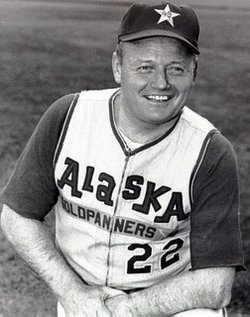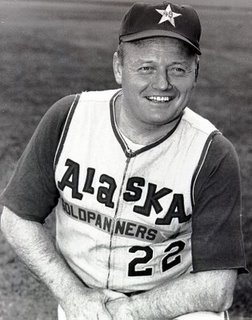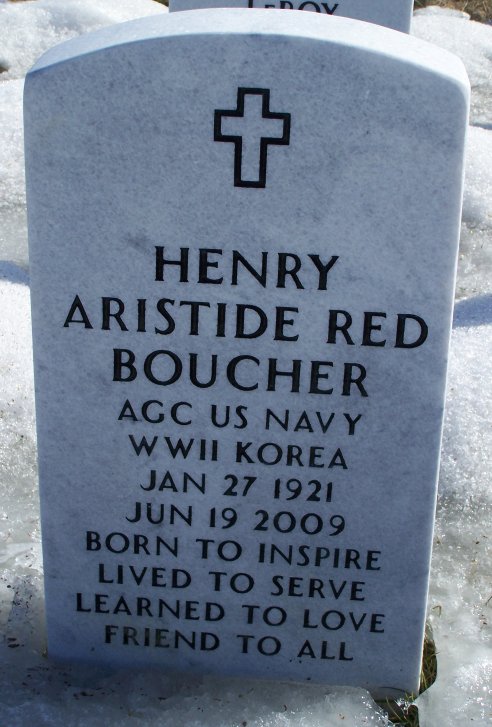Lieutenant Governor of Alaska (1970-1974). Boucher was born in New Hampshire, the son of Henry Aristide Boucher, Sr. and Helen Isabel Cameron. His father died shortly after his son's birth of the lingering complications of a mustard gas attack that he suffered during World War I, while he was stringing communications wire near Verdun, France in 1916. His mother was one of the first women Chief Petty Officers in the US Navy during World War I. He earned the nickname "Red" after meeting President Franklin D. Roosevelt as a child, who reportedly stated, "They ought to call you Red," in reference to his red hair. In 1938, at age 17 and with his mother's permission, Red joined the US Navy, training as a signalman and meteorologist. He would spend two years in the Pacific on the aircraft carrier, USS Enterprise, during World War II, in which he was in every major battle of the Pacific War. He would later relate that his best friend died in his arms during the Battle of Midway. He retired in 1958 as a twenty-year veteran Navy Chief Petty Officer. In 1958, Red campaigned for Senator John F. Kennedy. Heeding Kennedy's advise that Alaska was a territory of great potential, Boucher headed north, driving to Fairbanks in 1958, where he found work as a sporting goods sales representative, which later led to his opening his Pan Alaska Sports store. Shortly after his arrival, he became a member of the Alaska Statehood Commission. In 1959, Red founded the Gold Panners, a college level baseball team, and his enthusiastic drive led the Gold Panners to take the world title as the best non-pro baseball team in the country in both 1964 and 1966. Red became the National Baseball Congress' 1969 co-Manager of the Decade. On September 20, 2002, the Baseball Hall of Fame recognized Boucher's state and national contributions to baseball. Red Boucher served on Fairbanks City Council from 1961 to 1964, and then served as Mayor of Fairbanks from 1966 to 1970. During this period, Fairbanks was named All American City for how it handled the effects of the 1967 flood disaster. Red then became Lieutenant Governor, serving from 1970 to 1974. As Lieutenant Governor, he used the media to educate the nation on the importance of building the Trans-Alaska Oil Pipeline, helping to replace the prejudice and misinformation that created many objections to the pipeline. During this period, Boucher also helped develop a statewide telecommunications system, which brought rural Alaskans telephone, television and internet services. Trained by the US Navy as a radio and communications operator, Red used his skills to become President of Alaska Wireless, Inc., a consultant for COMPAQ and Hewlett Packard computers, and an advisor to Alaska's House of Representatives on Information Technology matters. At the age of 79, he received the President's Y2K Distinguished Service Medal for his help in preparing Alaska for the millennium rollover. Governor Tony Knowles also awarded Red Boucher the Alaskan Distinguished Service Medal for his "exceptionally meritorious service in a succession of key positions, all of which have had a significant and lasting impact upon the citizens of Alaska." In 2003, Boucher received an Honorary Doctor of Letters Degree from the University of Alaska, for his distinguished work as a public servant to the state of Alaska. He suffered a stroke in 2005, and died at the age of 88 at his home in Anchorage. Senator John Ellis said of him, "The biggest thing was his can-do spirit. He really harkened back to that old-time Alaska spirit of nothing could stand in our way. We didn't give a damn how they did it outside. We would do it the Alaskan way." Red Boucher was survived by his wife, Vicky Elkins Boucher, and their twelve children. (Bio by Kit and Morgan Benson)
Lieutenant Governor of Alaska (1970-1974). Boucher was born in New Hampshire, the son of Henry Aristide Boucher, Sr. and Helen Isabel Cameron. His father died shortly after his son's birth of the lingering complications of a mustard gas attack that he suffered during World War I, while he was stringing communications wire near Verdun, France in 1916. His mother was one of the first women Chief Petty Officers in the US Navy during World War I. He earned the nickname "Red" after meeting President Franklin D. Roosevelt as a child, who reportedly stated, "They ought to call you Red," in reference to his red hair. In 1938, at age 17 and with his mother's permission, Red joined the US Navy, training as a signalman and meteorologist. He would spend two years in the Pacific on the aircraft carrier, USS Enterprise, during World War II, in which he was in every major battle of the Pacific War. He would later relate that his best friend died in his arms during the Battle of Midway. He retired in 1958 as a twenty-year veteran Navy Chief Petty Officer. In 1958, Red campaigned for Senator John F. Kennedy. Heeding Kennedy's advise that Alaska was a territory of great potential, Boucher headed north, driving to Fairbanks in 1958, where he found work as a sporting goods sales representative, which later led to his opening his Pan Alaska Sports store. Shortly after his arrival, he became a member of the Alaska Statehood Commission. In 1959, Red founded the Gold Panners, a college level baseball team, and his enthusiastic drive led the Gold Panners to take the world title as the best non-pro baseball team in the country in both 1964 and 1966. Red became the National Baseball Congress' 1969 co-Manager of the Decade. On September 20, 2002, the Baseball Hall of Fame recognized Boucher's state and national contributions to baseball. Red Boucher served on Fairbanks City Council from 1961 to 1964, and then served as Mayor of Fairbanks from 1966 to 1970. During this period, Fairbanks was named All American City for how it handled the effects of the 1967 flood disaster. Red then became Lieutenant Governor, serving from 1970 to 1974. As Lieutenant Governor, he used the media to educate the nation on the importance of building the Trans-Alaska Oil Pipeline, helping to replace the prejudice and misinformation that created many objections to the pipeline. During this period, Boucher also helped develop a statewide telecommunications system, which brought rural Alaskans telephone, television and internet services. Trained by the US Navy as a radio and communications operator, Red used his skills to become President of Alaska Wireless, Inc., a consultant for COMPAQ and Hewlett Packard computers, and an advisor to Alaska's House of Representatives on Information Technology matters. At the age of 79, he received the President's Y2K Distinguished Service Medal for his help in preparing Alaska for the millennium rollover. Governor Tony Knowles also awarded Red Boucher the Alaskan Distinguished Service Medal for his "exceptionally meritorious service in a succession of key positions, all of which have had a significant and lasting impact upon the citizens of Alaska." In 2003, Boucher received an Honorary Doctor of Letters Degree from the University of Alaska, for his distinguished work as a public servant to the state of Alaska. He suffered a stroke in 2005, and died at the age of 88 at his home in Anchorage. Senator John Ellis said of him, "The biggest thing was his can-do spirit. He really harkened back to that old-time Alaska spirit of nothing could stand in our way. We didn't give a damn how they did it outside. We would do it the Alaskan way." Red Boucher was survived by his wife, Vicky Elkins Boucher, and their twelve children. (Bio by Kit and Morgan Benson)
Sponsored by Ancestry
Advertisement
Advertisement



